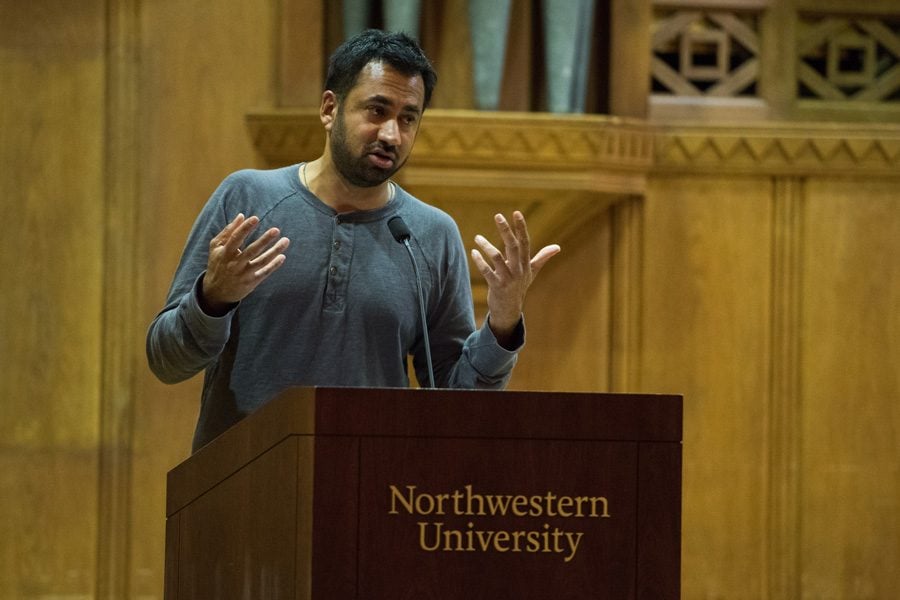Actor Kal Penn discusses diversity in media, personal career experiences
Katie Pach/The Daily Northwestern
Kal Penn speaks at Lutkin Hall on Friday. Penn, known for his role as Kumar Patel in the comedy film “Harold & Kumar Go to White Castle,” discussed his career and diversity in the film industry.
May 22, 2016
Television has become more representative of diversity, but needs more progress in that direction, Kal Penn, actor and former associate director in the White House’s Office of Public Engagement, told an audience of roughly 150 people Friday night.
“What you see on TV is not the reality of what America looks like demographically,” he said. “That’s not because there’s not enough of a trained actor pool and writer pool to fill those roles. It’s mostly because of the limited number of roles and the general lack of willingness by big media companies to finance and produce and cast things in a more color-blind or gender-blind type of way.”
Known for his roles as Kumar Patel in the comedy film “Harold & Kumar Go to White Castle,” Gogol Ganguli in “The Namesake” and Dr. Lawrence Kutner in the TV show “House,” Penn — whose real name is Kalpen Modi — spoke as South Asian Student Alliance’s annual spring speaker in Lutkin Hall.
Penn discussed his experience as an Indian-American actor, mentioning instances in which members of the entertainment industry stereotyped him. He said at one of his first auditions the casting director told him to go home and put a bed sheet on his head to resemble a turban.
But he said although non-white actors are still underrepresented in the film industry, digital media has made significant progress, with platforms like Hulu picking up shows such as “The Mindy Project,” which features a diverse cast and resists stereotypes about Indian-Americans.
He also talked about his work with Asian-American and Pacific Islander outreach in President Barack Obama’s administration, in which he served for more than two years after volunteering for Obama’s campaign in its early stages.
“Seeing up close things like how you draw down the Iraq War and how you build up the Pell Grant (system) and how you do things people actually care about was really fascinating,” he said.
Penn said he has enjoyed his experiences as an actor and political activist equally, and that each has a unique ability to benefit society.
He also said he never imagined having the opportunity to work in either realm, and noted the increasing accessibility of these careers.
“Things are changing so much now that you don’t have to be well connected or have a billion dollars to enter public service or politics or the media,” Penn said. “It’s a wonderful, fantastic time to chase those dreams right now.”
Tarushi Sharma, vice president of educational affairs for SASA, said the group looks for speakers who can serve as role models for South Asian students and who have “made it past discrimination and hardships we might be also facing.”
She said Penn’s success in both acting and political activism made him a particularly desirable choice.
“Right now, the main South Asian role models we see are in pop culture,” the Weinberg freshman said. “We thought Kal Penn was a great example that you can not only be seen as a stereotypical Indian man in the media, but you can also take that success and use that to your advantage to turn into something bigger than just getting out laughs and entertainment.”
Weinberg sophomore Chandrasekar Muthiah, who attended the talk, said he was inspired by the scope of Penn’s career.
He also said he admires and appreciates the way Penn has defied Indian stereotypes as an actor, specifically through non-traditional roles, such as the laid-back character Kumar Patel.
“Growing up, a lot of people think Indians are only going to be academic and they’re going to be kind of nerdy, so it’s really cool that they brought in this speaker that kind of revolutionized that for everyone,” he said.
Email: [email protected]
Twitter: @_juliadoran


